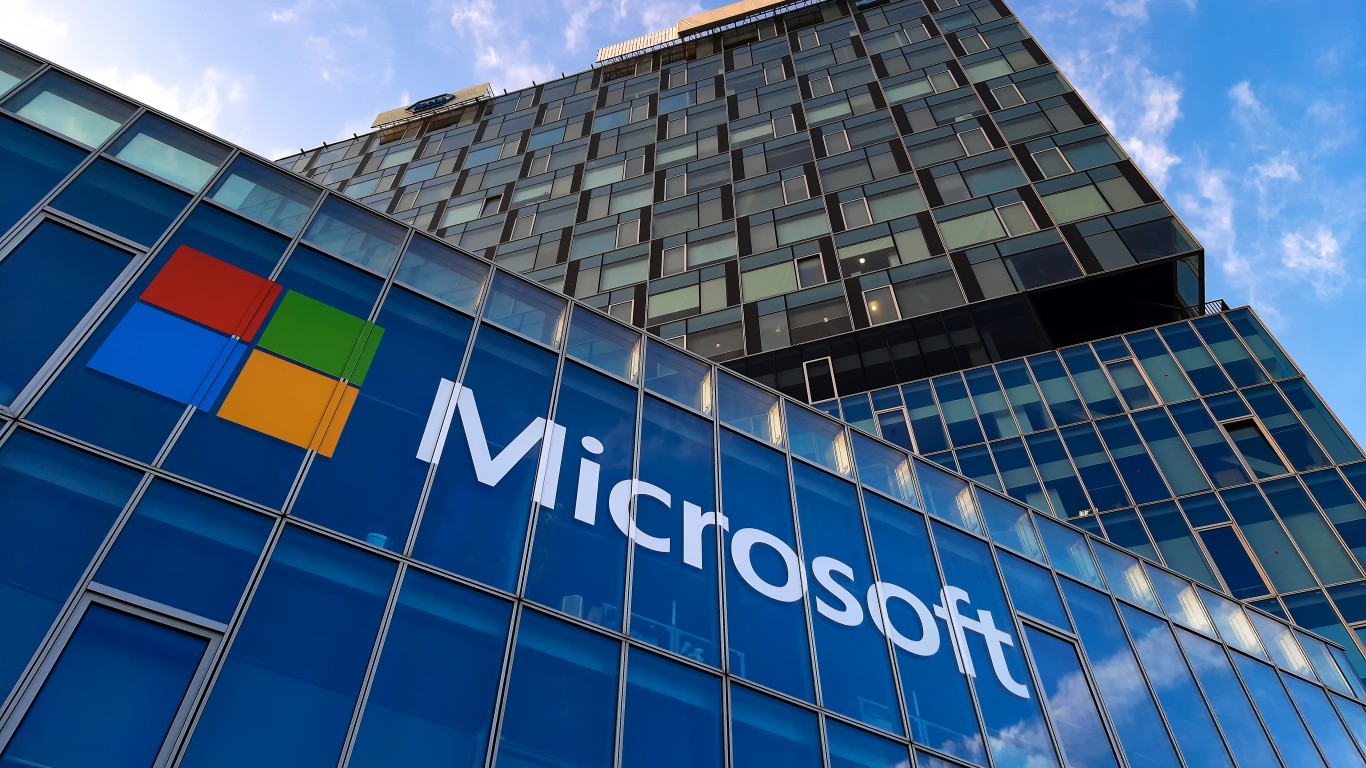

Big business has long been, and will long remain, an economic pillar in the United States. Still, the free market is always evolving, and over time, shifts in consumer preferences inevitably change the face of corporate America. Of the 10 most valuable U.S. companies in 2024, half are less than 35 years old — and none ranked among the 10 most valuable companies 35 years ago.
Using data compiled from a range of financial media outlets by an investor news blog, 24/7 Wall St. identified the most valuable American companies every year since 1990. For each year, we ranked the 10 S&P 500 companies with the highest estimated market capitalization as of January 1. Only companies that are still currently publicly traded were considered in this ranking.
Market capitalization, or market cap, is calculated by multiplying the number of outstanding shares of a publicly traded company by the value of a single share. Reflecting supply and demand dynamics, market cap is a preferred metric for gauging a company’s value. It is important to note that the values reflected in this story represent a snapshot in time, and that for any given company, market cap is subject to meaningful fluctuation.
In previous decades, the most valuable American companies were largely in the business of manufacturing and selling everyday household and personal products. Companies like Coca-Cola (NYSE: KO), General Electric (NYSE: GE), and Procter & Gamble (NYSE: PG) regularly ranked among the 10 most valuable companies in the 1990’s and 2000’s None of these companies, however, ranked among the most valuable companies in at least the last nine years. (Here is a look at 20 companies that dominated corporate America in the 90’s.)
Today, the most valuable American companies are overwhelmingly concentrated in the technology sector. Tech giants Alphabet (NASDAQ: GOOG), Amazon (NASDAQ: AMZN), Apple (NASDAQ: AAPL), and Meta (NASDAQ: META) have ranked among the 10 U.S. companies with the largest market cap in at least eight of the last nine years. For other companies, high valuations in the last decade are partially attributable to mergers. For example, J.P. Morgan merged with Chase Manhattan in 2000 to form JPMorgan Chase (NYSE: JPM), a financial services firm that has regularly ranked among the largest U.S. companies in recent years. (Here is a look at 50 brands that blew up this year.)
Notably, there are also several American companies that have maintained leading market caps for most of the last three and a half decades. Companies like Exxon Mobil (NYSE: XOM), Johnson & Johnson (NYSE: JNJ), Microsoft (NASDAQ: MSFT), and Walmart (NYSE: WMT) each appear on this list in at least 25 of the last 35 years.
Just as the biggest names in corporate America have changed since 1990, so too has their relative value. Between 1990 and 1996, the combined market cap of the 10 most valuable companies was equivalent to less than 10% of U.S. GDP. As of the beginning of 2022, the 10 most valuable U.S. companies were worth nearly $13.4 trillion, or 53% of U.S. GDP.
Why It Matters
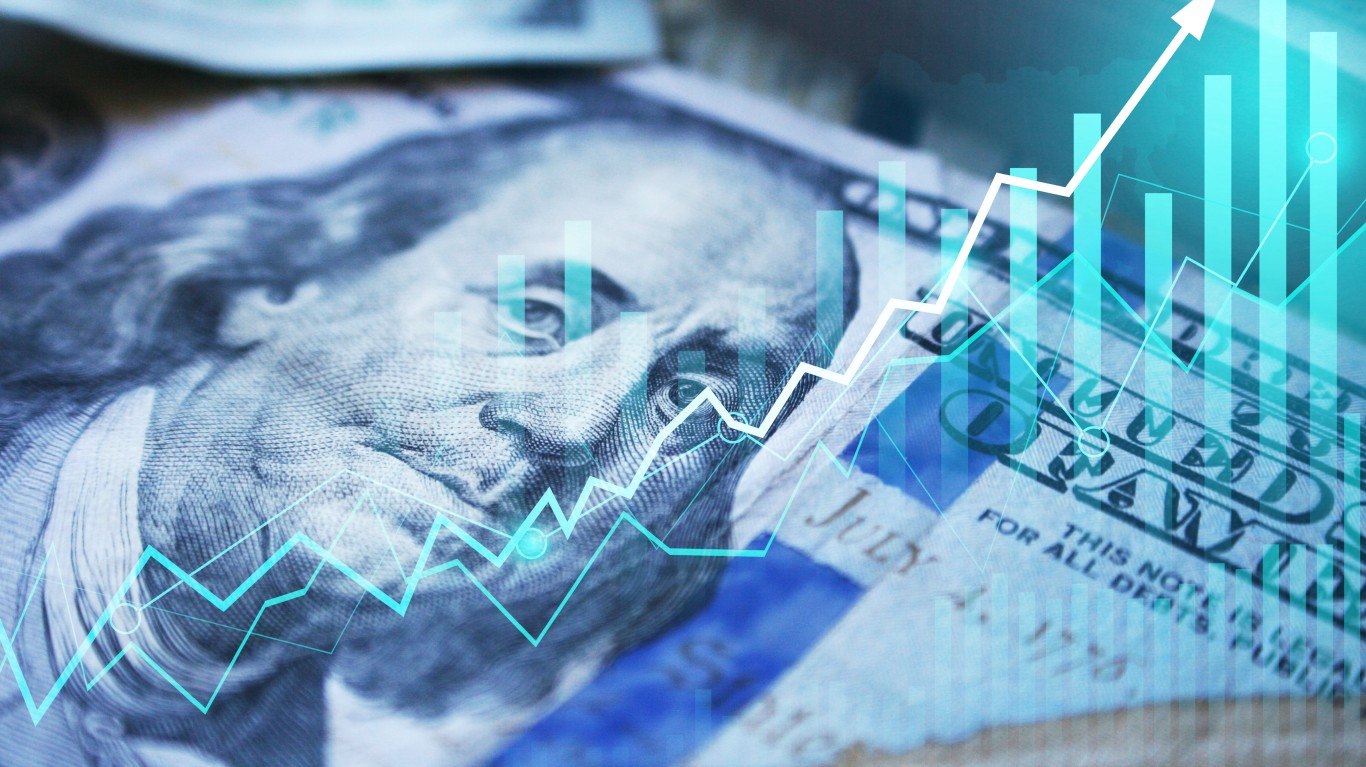
Consumer spending has accounted for well over 50% of American gross domestic product every year since at least the late 1940s, according to the U.S. Bureau of Economic Analysis. As of Q1 2024, personal spending generated nearly 68% of national GDP. Dependent on consumer spending, the health of the U.S. economy is closely tied to corporate performance. In recent decades, the face of corporate America has changed considerably. Several American companies — concentrated exclusively in the tech sector — now have estimated market caps exceeding $1 trillion, an unheard of valuation in previous decades.
Year: 1990
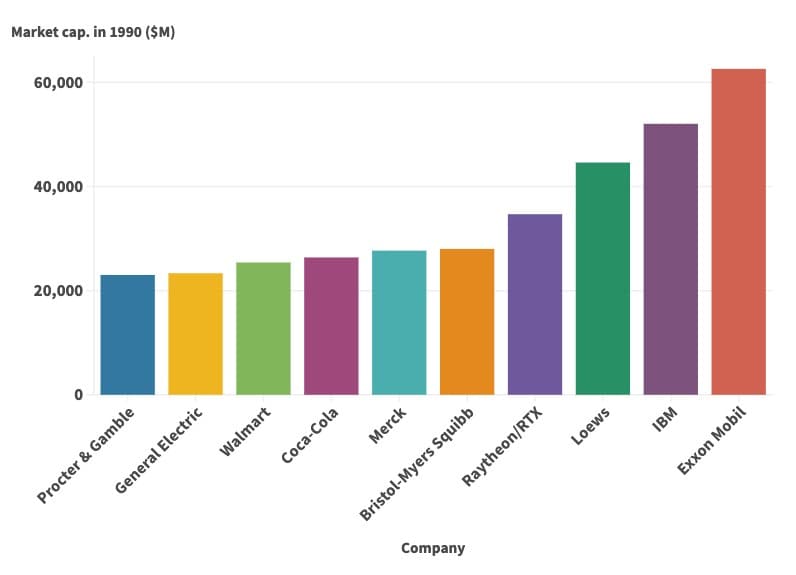
- 10. Procter & Gamble (PG): $23 billion market cap. (Industry: Household and personal products)
- 9. General Electric (GE): $23.3 billion market cap. (Industry: Aerospace and defense)
- 8. Walmart (WMT): $25.4 billion market cap. (Industry: Discount stores)
- 7. Coca-Cola (KO): $26.4 billion market cap. (Industry: Beverages)
- 6. Merck (MRK): $27.7 billion market cap. (Industry: Drug manufacturing)
- 5. Bristol-Myers Squibb (BMY): $28 billion market cap. (Industry: Drug manufacturing)
- 4. Raytheon/RTX (RTX): $34.7 billion market cap. (Industry: Aerospace and defense)
- 3. Loews (L): $44.6 billion market cap. (Industry: Property and casualty insurance)
- 2. International Business Machines (IBM): $52 billion market cap. (Industry: Information technology services)
- 1. Exxon Mobil (XOM): $62.6 billion market cap. (Industry: Oil and gas)
Year: 1991
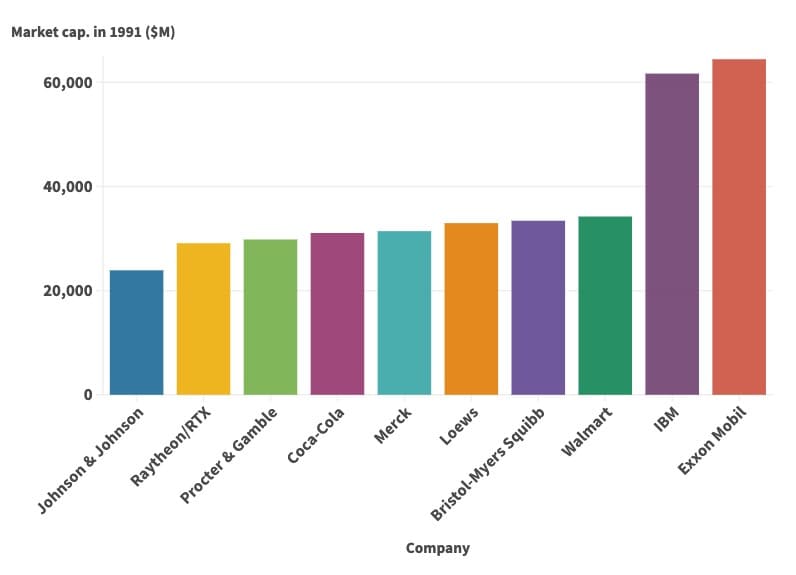
- 10. Johnson & Johnson (JNJ): $23.9 billion market cap. (Industry: Drug manufacturing)
- 9. Raytheon/RTX (RTX): $29.1 billion market cap. (Industry: Aerospace and defense)
- 8. Procter & Gamble (PG): $29.8 billion market cap. (Industry: Household and personal products)
- 7. Coca-Cola (KO): $31.1 billion market cap. (Industry: Beverages)
- 6. Merck (MRK): $31.4 billion market cap. (Industry: Drug manufacturing)
- 5. Loews (L): $33 billion market cap. (Industry: Property and casualty insurance)
- 4. Bristol-Myers Squibb (BMY): $33.4 billion market cap. (Industry: Drug manufacturing)
- 3. Walmart (WMT): $34.2 billion market cap. (Industry: Discount stores)
- 2. International Business Machines (IBM): $61.7 billion market cap. (Industry: Information technology services)
- 1. Exxon Mobil (XOM): $64.4 billion market cap. (Industry: Oil and gas)
Year: 1992
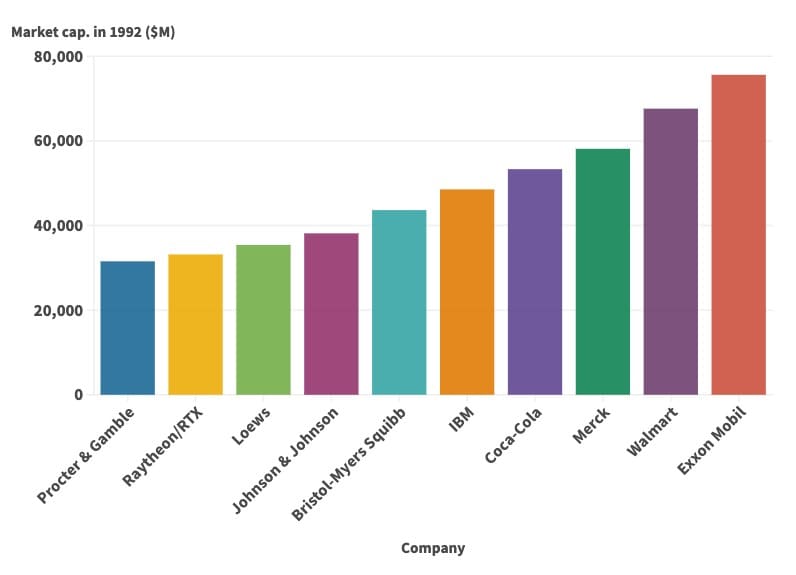
- 10. Procter & Gamble (PG): $31.5 billion market cap. (Industry: Household and personal products)
- 9. Raytheon/RTX (RTX): $33.2 billion market cap. (Industry: Aerospace and defense)
- 8. Loews (L): $35.4 billion market cap. (Industry: Property and casualty insurance)
- 7. Johnson & Johnson (JNJ): $38.2 billion market cap. (Industry: Drug manufacturing)
- 6. Bristol-Myers Squibb (BMY): $43.7 billion market cap. (Industry: Drug manufacturing)
- 5. International Business Machines (IBM): $48.5 billion market cap. (Industry: Information technology services)
- 4. Coca-Cola (KO): $53.3 billion market cap. (Industry: Beverages)
- 3. Merck (MRK): $58.1 billion market cap. (Industry: Drug manufacturing)
- 2. Walmart (WMT): $67.6 billion market cap. (Industry: Discount stores)
- 1. Exxon Mobil (XOM): $75.6 billion market cap. (Industry: Oil and gas)
Year: 1993
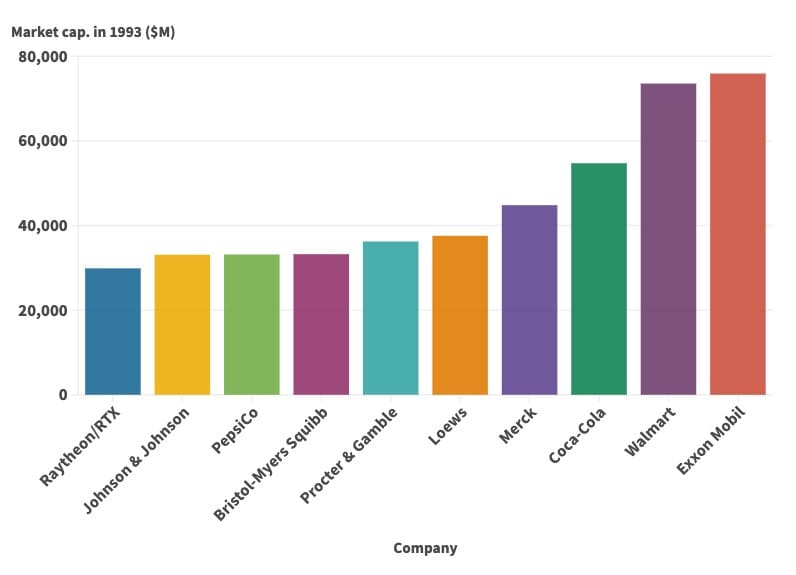
- 10. Raytheon/RTX (RTX): $29.9 billion market cap. (Industry: Aerospace and defense)
- 9. Johnson & Johnson (JNJ): $33.1 billion market cap. (Industry: Drug manufacturing)
- 8. PepsiCo (PEP): $33.2 billion market cap. (Industry: Beverages)
- 7. Bristol-Myers Squibb (BMY): $33.2 billion market cap. (Industry: Drug manufacturing)
- 6. Procter & Gamble (PG): $36.2 billion market cap. (Industry: Household and personal products)
- 5. Loews (L): $37.6 billion market cap. (Industry: Property and casualty insurance)
- 4. Merck (MRK): $44.8 billion market cap. (Industry: Drug manufacturing)
- 3. Coca-Cola (KO): $54.7 billion market cap. (Industry: Beverages)
- 2. Walmart (WMT): $73.6 billion market cap. (Industry: Discount stores)
- 1. Exxon Mobil (XOM): $75.9 billion market cap. (Industry: Oil and gas)
Year: 1994
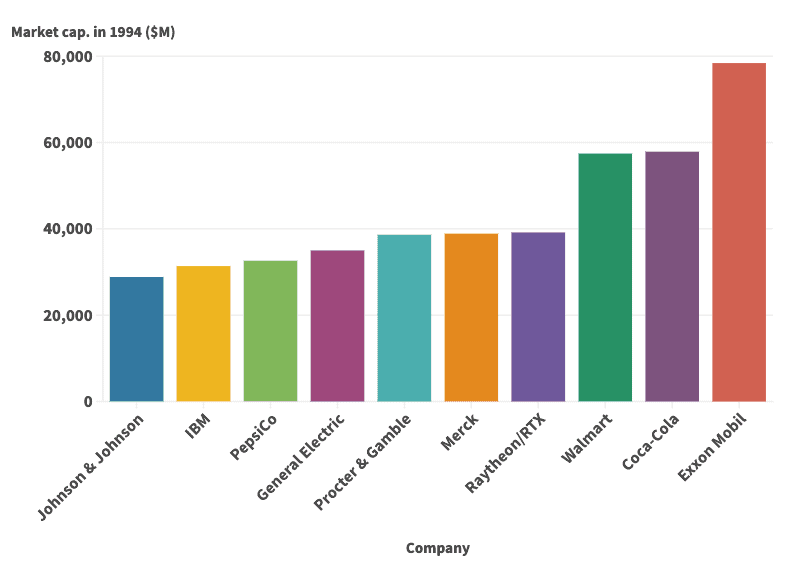
- 10. Johnson & Johnson (JNJ): $28.9 billion market cap. (Industry: Drug manufacturing)
- 9. International Business Machines (IBM): $31.4 billion market cap. (Industry: Information technology services)
- 8. PepsiCo (PEP): $32.7 billion market cap. (Industry: Beverages)
- 7. General Electric (GE): $35 billion market cap. (Industry: Aerospace and defense)
- 6. Procter & Gamble (PG): $38.6 billion market cap. (Industry: Household and personal products)
- 5. Merck (MRK): $38.9 billion market cap. (Industry: Drug manufacturing)
- 4. Raytheon/RTX (RTX): $39.2 billion market cap. (Industry: Aerospace and defense)
- 3. Walmart (WMT): $57.5 billion market cap. (Industry: Discount stores)
- 2. Coca-Cola (KO): $57.9 billion market cap. (Industry: Beverages)
- 1. Exxon Mobil (XOM): $78.4 billion market cap. (Industry: Oil and gas)
Year: 1995
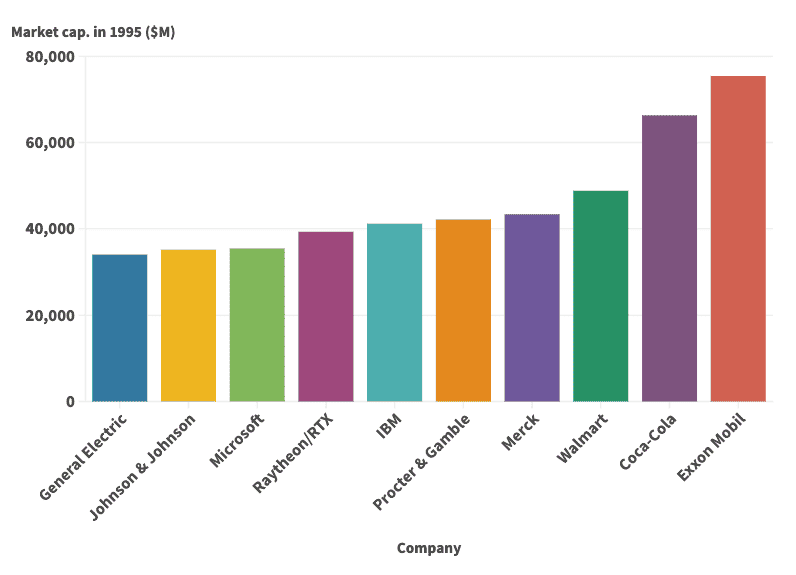
- 10. General Electric (GE): $34.1 billion market cap. (Industry: Aerospace and defense)
- 9. Johnson & Johnson (JNJ): $35.2 billion market cap. (Industry: Drug manufacturing)
- 8. Microsoft (MSFT): $35.5 billion market cap. (Industry: Software infrastructure)
- 7. Raytheon/RTX (RTX): $39.3 billion market cap. (Industry: Aerospace and defense)
- 6. International Business Machines (IBM): $41.2 billion market cap. (Industry: Information technology services)
- 5. Procter & Gamble (PG): $42.2 billion market cap. (Industry: Household and personal products)
- 4. Merck (MRK): $43.4 billion market cap. (Industry: Drug manufacturing)
- 3. Walmart (WMT): $48.8 billion market cap. (Industry: Discount stores)
- 2. Coca-Cola (KO): $66.3 billion market cap. (Industry: Beverages)
- 1. Exxon Mobil (XOM): $75.4 billion market cap. (Industry: Oil and gas)
Year: 1996
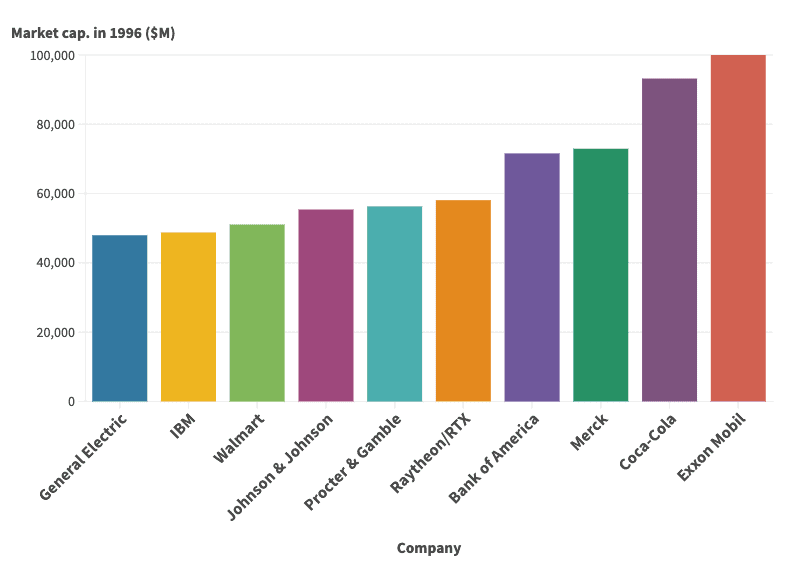
- 10. General Electric (GE): $48 billion market cap. (Industry: Aerospace and defense)
- 9. International Business Machines (IBM): $48.7 billion market cap. (Industry: Information technology services)
- 8. Walmart (WMT): $51.1 billion market cap. (Industry: Discount stores)
- 7. Johnson & Johnson (JNJ): $55.4 billion market cap. (Industry: Drug manufacturing)
- 6. Procter & Gamble (PG): $56.3 billion market cap. (Industry: Household and personal products)
- 5. Raytheon/RTX (RTX): $58.1 billion market cap. (Industry: Aerospace and defense)
- 4. Bank of America (BAC): $71.6 billion market cap. (Industry: Banking)
- 3. Merck (MRK): $73 billion market cap. (Industry: Drug manufacturing)
- 2. Coca-Cola (KO): $93.2 billion market cap. (Industry: Beverages)
- 1. Exxon Mobil (XOM): $100 billion market cap. (Industry: Oil and gas)
Year: 1997
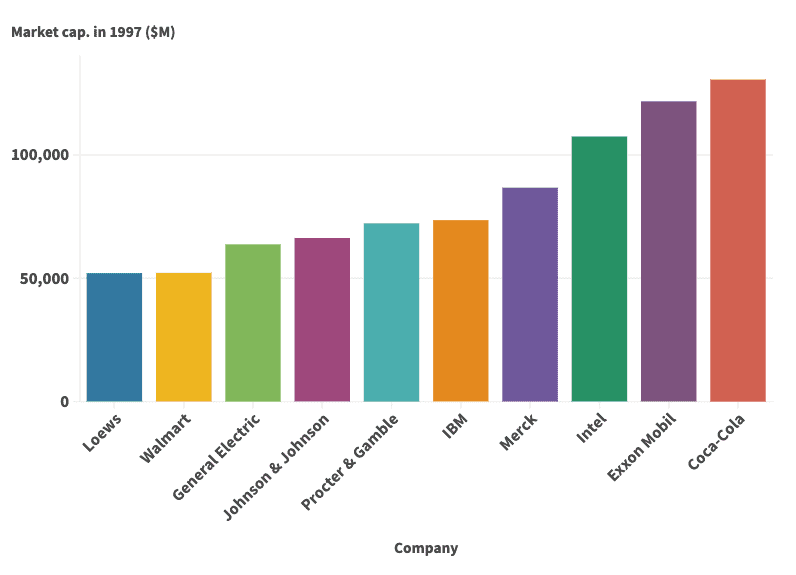
- 10. Loews (L): $52 billion market cap. (Industry: Property and casualty insurance)
- 9. Walmart (WMT): $52.2 billion market cap. (Industry: Discount stores)
- 8. General Electric (GE): $63.7 billion market cap. (Industry: Aerospace and defense)
- 7. Johnson & Johnson (JNJ): $66.3 billion market cap. (Industry: Drug manufacturing)
- 6. Procter & Gamble (PG): $72.2 billion market cap. (Industry: Household and personal products)
- 5. International Business Machines (IBM): $73.5 billion market cap. (Industry: Information technology services)
- 4. Merck (MRK): $86.7 billion market cap. (Industry: Drug manufacturing)
- 3. Intel (INTC): $107.5 billion market cap. (Industry: Semiconductors)
- 2. Exxon Mobil (XOM): $121.7 billion market cap. (Industry: Oil and gas)
- 1. Coca-Cola (KO): $130.6 billion market cap. (Industry: Beverages)
Year: 1998
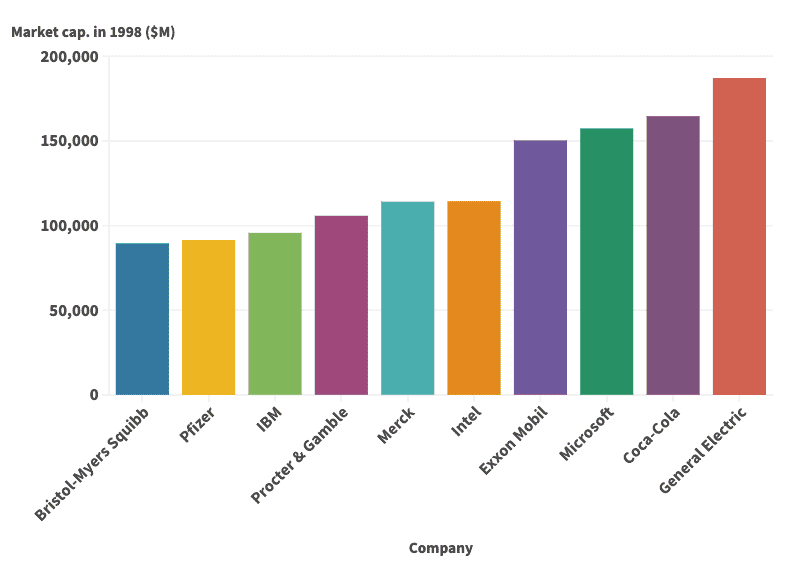
- 10. Bristol-Myers Squibb (BMY): $89.5 billion market cap. (Industry: Drug manufacturing)
- 9. Pfizer (PFE): $91.4 billion market cap. (Industry: Drug manufacturing)
- 8. International Business Machines (IBM): $95.7 billion market cap. (Industry: Information technology services)
- 7. Procter & Gamble (PG): $105.8 billion market cap. (Industry: Household and personal products)
- 6. Merck (MRK): $114.2 billion market cap. (Industry: Drug manufacturing)
- 5. Intel (INTC): $114.4 billion market cap. (Industry: Semiconductors)
- 4. Exxon Mobil (XOM): $150.3 billion market cap. (Industry: Oil and gas)
- 3. Microsoft (MSFT): $157.4 billion market cap. (Industry: Software infrastructure)
- 2. Coca-Cola (KO): $164.6 billion market cap. (Industry: Beverages)
- 1. General Electric (GE): $187.1 billion market cap. (Industry: Aerospace and defense)
Year: 1999
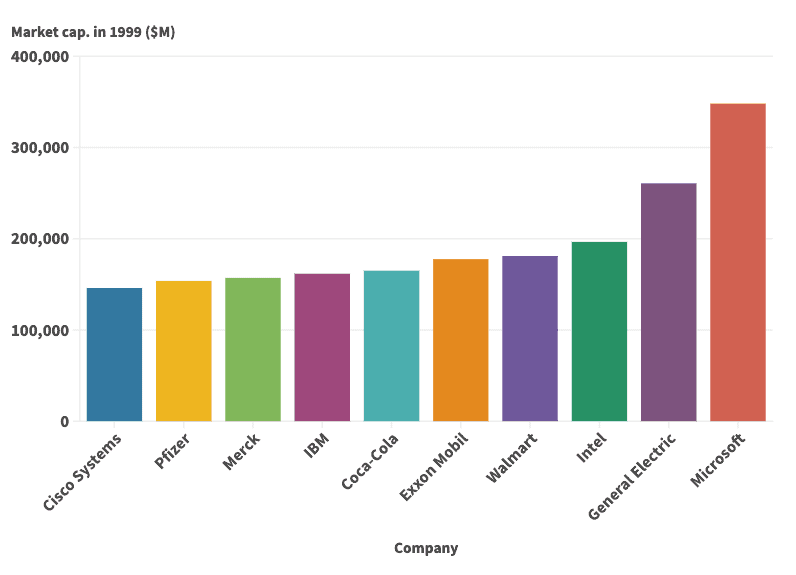
- 10. Cisco Systems (CSCO): $146 billion market cap. (Industry: Communication equipment)
- 9. Pfizer (PFE): $153.8 billion market cap. (Industry: Drug manufacturing)
- 8. Merck (MRK): $157.1 billion market cap. (Industry: Drug manufacturing)
- 7. International Business Machines (IBM): $161.6 billion market cap. (Industry: Information technology services)
- 6. Coca-Cola (KO): $164.9 billion market cap. (Industry: Beverages)
- 5. Exxon Mobil (XOM): $177.6 billion market cap. (Industry: Oil and gas)
- 4. Walmart (WMT): $181.1 billion market cap. (Industry: Discount stores)
- 3. Intel (INTC): $196.5 billion market cap. (Industry: Semiconductors)
- 2. General Electric (GE): $260.8 billion market cap. (Industry: Aerospace and defense)
- 1. Microsoft (MSFT): $348.1 billion market cap. (Industry: Software infrastructure)
Year: 2000
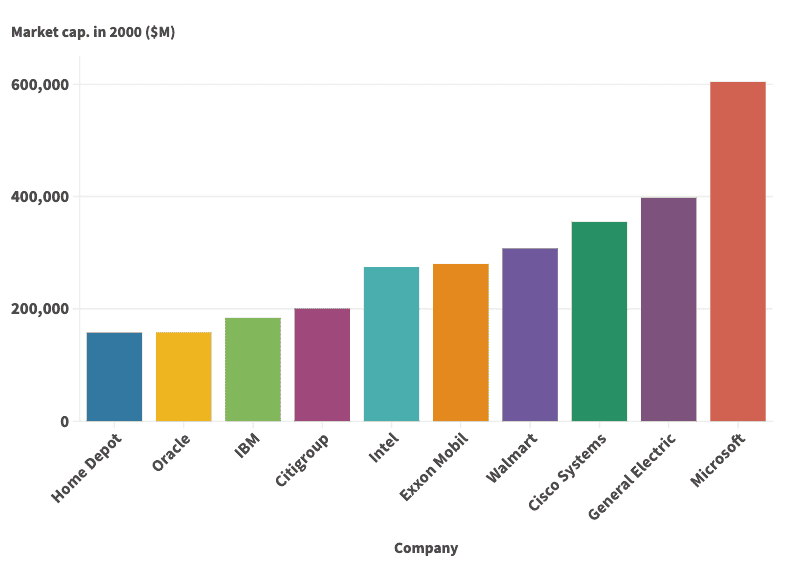
- 10. Home Depot (HD): $157.9 billion market cap. (Industry: Home improvement retail)
- 9. Oracle (ORCL): $158.1 billion market cap. (Industry: Software infrastructure)
- 8. International Business Machines (IBM): $184.1 billion market cap. (Industry: Information technology services)
- 7. Citigroup (C): $200.7 billion market cap. (Industry: Banking)
- 6. Intel (INTC): $274.4 billion market cap. (Industry: Semiconductors)
- 5. Exxon Mobil (XOM): $280.1 billion market cap. (Industry: Oil and gas)
- 4. Walmart (WMT): $307.9 billion market cap. (Industry: Discount stores)
- 3. Cisco Systems (CSCO): $355.1 billion market cap. (Industry: Communication equipment)
- 2. General Electric (GE): $397.9 billion market cap. (Industry: Aerospace and defense)
- 1. Microsoft (MSFT): $604.4 billion market cap. (Industry: Software infrastructure)
Year: 2001
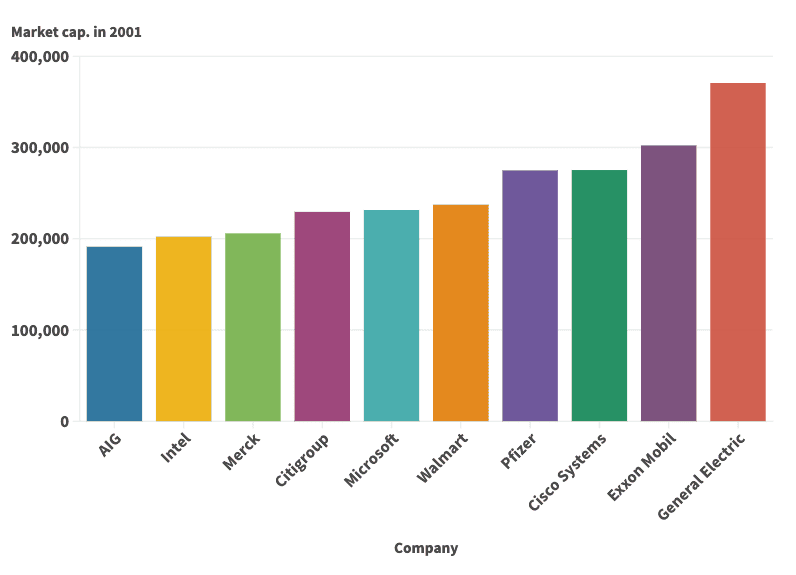
- 10. AIG (AIG): $191.2 billion market cap. (Industry: Insurance – diversified)
- 9. Intel (INTC): $202.3 billion market cap. (Industry: Semiconductors)
- 8. Merck (MRK): $205.9 billion market cap. (Industry: Drug manufacturing)
- 7. Citigroup (C): $229.4 billion market cap. (Industry: Banking)
- 6. Microsoft (MSFT): $231.3 billion market cap. (Industry: Software infrastructure)
- 5. Walmart (WMT): $237.3 billion market cap. (Industry: Discount stores)
- 4. Pfizer (PFE): $274.9 billion market cap. (Industry: Drug manufacturing)
- 3. Cisco Systems (CSCO): $275.3 billion market cap. (Industry: Communication equipment)
- 2. Exxon Mobil (XOM): $302.2 billion market cap. (Industry: Oil and gas)
- 1. General Electric (GE): $370.7 billion market cap. (Industry: Aerospace and defense)
Year: 2002
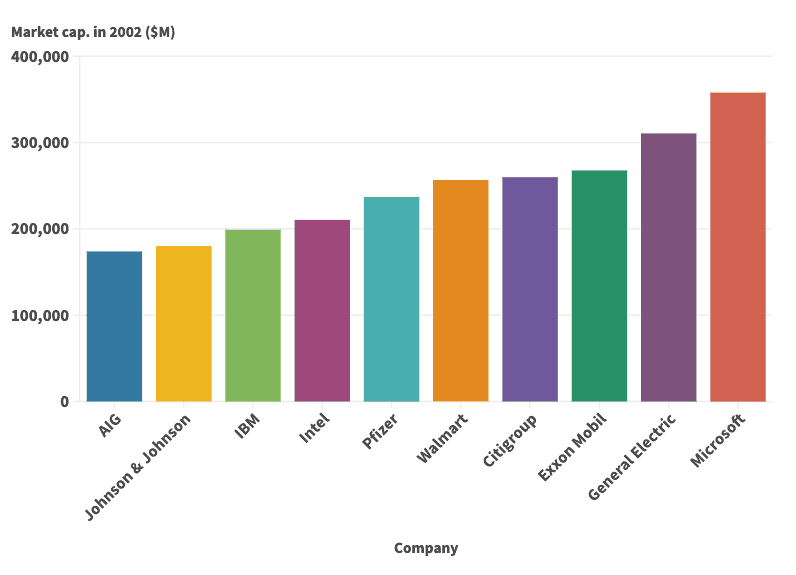
- 10. AIG (AIG): $174 billion market cap. (Industry: Insurance – diversified)
- 9. Johnson & Johnson (JNJ): $180.1 billion market cap. (Industry: Drug manufacturing)
- 8. International Business Machines (IBM): $199.1 billion market cap. (Industry: Information technology services)
- 7. Intel (INTC): $210.4 billion market cap. (Industry: Semiconductors)
- 6. Pfizer (PFE): $237 billion market cap. (Industry: Drug manufacturing)
- 5. Walmart (WMT): $256.5 billion market cap. (Industry: Discount stores)
- 4. Citigroup (C): $259.9 billion market cap. (Industry: Banking)
- 3. Exxon Mobil (XOM): $267.6 billion market cap. (Industry: Oil and gas)
- 2. General Electric (GE): $310.8 billion market cap. (Industry: Aerospace and defense)
- 1. Microsoft (MSFT): $358 billion market cap. (Industry: Software infrastructure)
Year: 2003
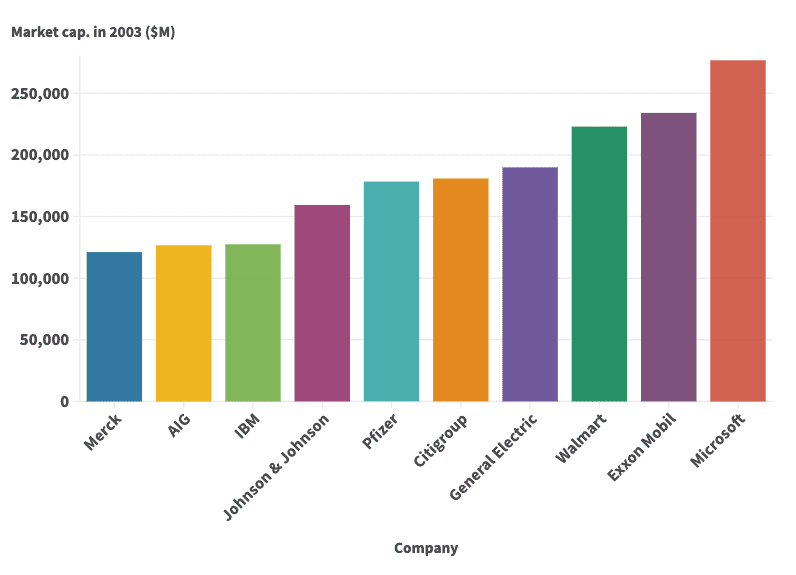
- 10. Merck (MRK): $121.2 billion market cap. (Industry: Drug manufacturing)
- 9. AIG (AIG): $126.5 billion market cap. (Industry: Insurance – diversified)
- 8. International Business Machines (IBM): $127.5 billion market cap. (Industry: Information technology services)
- 7. Johnson & Johnson (JNJ): $159.4 billion market cap. (Industry: Drug manufacturing)
- 6. Pfizer (PFE): $178.5 billion market cap. (Industry: Drug manufacturing)
- 5. Citigroup (C): $180.9 billion market cap. (Industry: Banking)
- 4. General Electric (GE): $189.9 billion market cap. (Industry: Aerospace and defense)
- 3. Walmart (WMT): $223 billion market cap. (Industry: Discount stores)
- 2. Exxon Mobil (XOM): $234.1 billion market cap. (Industry: Oil and gas)
- 1. Microsoft (MSFT): $276.6 billion market cap. (Industry: Software infrastructure)
Year: 2004
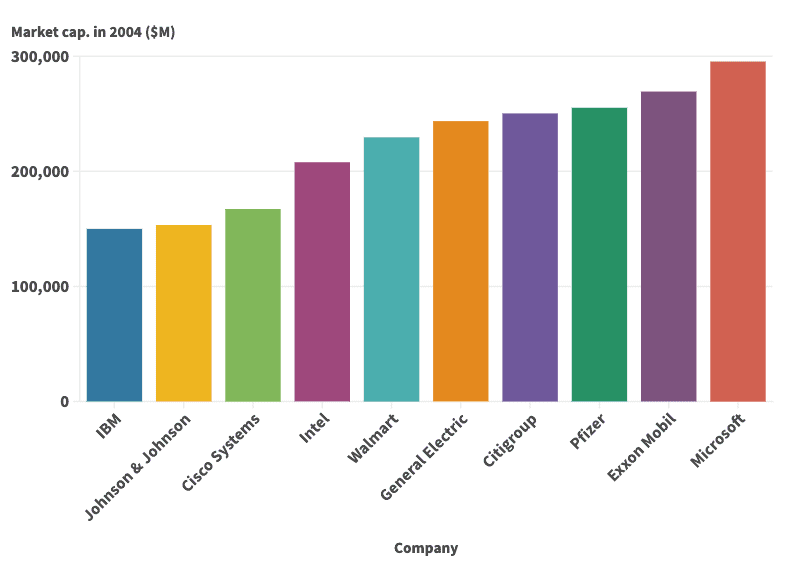
- 10. International Business Machines (IBM): $150 billion market cap. (Industry: Information technology services)
- 9. Johnson & Johnson (JNJ): $153.3 billion market cap. (Industry: Drug manufacturing)
- 8. Cisco Systems (CSCO): $167.3 billion market cap. (Industry: Communication equipment)
- 7. Intel (INTC): $207.9 billion market cap. (Industry: Semiconductors)
- 6. Walmart (WMT): $229.6 billion market cap. (Industry: Discount stores)
- 5. General Electric (GE): $243.7 billion market cap. (Industry: Aerospace and defense)
- 4. Citigroup (C): $250.3 billion market cap. (Industry: Banking)
- 3. Pfizer (PFE): $255.3 billion market cap. (Industry: Drug manufacturing)
- 2. Exxon Mobil (XOM): $269.3 billion market cap. (Industry: Oil and gas)
- 1. Microsoft (MSFT): $295.3 billion market cap. (Industry: Software infrastructure)
Year: 2005
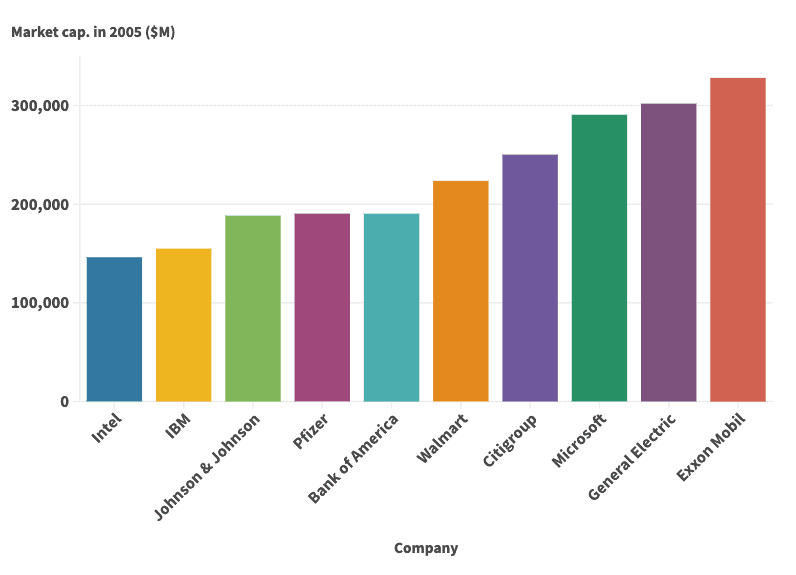
- 10. Intel (INTC): $146.3 billion market cap. (Industry: Semiconductors)
- 9. International Business Machines (IBM): $155 billion market cap. (Industry: Information technology services)
- 8. Johnson & Johnson (JNJ): $188.4 billion market cap. (Industry: Drug manufacturing)
- 7. Pfizer (PFE): $190.4 billion market cap. (Industry: Drug manufacturing)
- 6. Bank of America (BAC): $190.5 billion market cap. (Industry: Banking)
- 5. Walmart (WMT): $223.7 billion market cap. (Industry: Discount stores)
- 4. Citigroup (C): $250.3 billion market cap. (Industry: Banking)
- 3. Microsoft (MSFT): $290.7 billion market cap. (Industry: Software infrastructure)
- 2. General Electric (GE): $301.9 billion market cap. (Industry: Aerospace and defense)
- 1. Exxon Mobil (XOM): $328.1 billion market cap. (Industry: Oil and gas)
Year: 2006
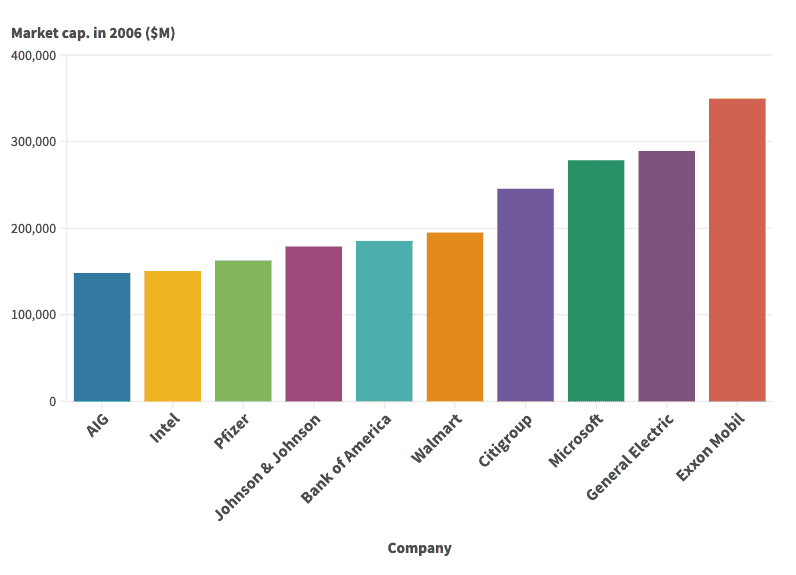
- 10. AIG (AIG): $148.4 billion market cap. (Industry: Insurance – diversified)
- 9. Intel (INTC): $150.5 billion market cap. (Industry: Semiconductors)
- 8. Pfizer (PFE): $162.9 billion market cap. (Industry: Drug manufacturing)
- 7. Johnson & Johnson (JNJ): $178.8 billion market cap. (Industry: Drug manufacturing)
- 6. Bank of America (BAC): $185.3 billion market cap. (Industry: Banking)
- 5. Walmart (WMT): $194.9 billion market cap. (Industry: Discount stores)
- 4. Citigroup (C): $245.5 billion market cap. (Industry: Banking)
- 3. Microsoft (MSFT): $278.4 billion market cap. (Industry: Software infrastructure)
- 2. General Electric (GE): $289 billion market cap. (Industry: Aerospace and defense)
- 1. Exxon Mobil (XOM): $349.5 billion market cap. (Industry: Oil and gas)
Year: 2007
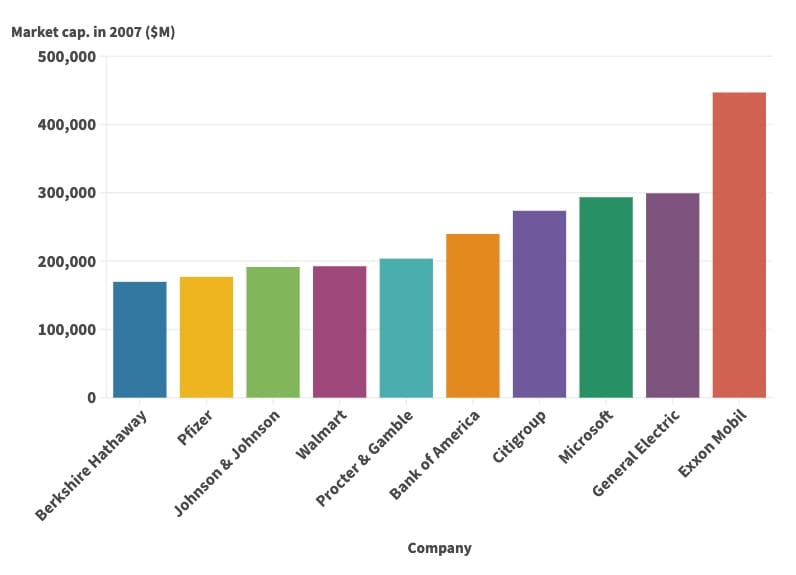
- 10. Berkshire Hathaway (BRK-A/B): $169.6 billion market cap. (Industry: Insurance – diversified)
- 9. Pfizer (PFE): $176.9 billion market cap. (Industry: Drug manufacturing)
- 8. Johnson & Johnson (JNJ): $191.4 billion market cap. (Industry: Drug manufacturing)
- 7. Walmart (WMT): $192.5 billion market cap. (Industry: Discount stores)
- 6. Procter & Gamble (PG): $203.7 billion market cap. (Industry: Household and personal products)
- 5. Bank of America (BAC): $239.8 billion market cap. (Industry: Banking)
- 4. Citigroup (C): $273.7 billion market cap. (Industry: Banking)
- 3. Microsoft (MSFT): $293.5 billion market cap. (Industry: Software infrastructure)
- 2. General Electric (GE): $299.3 billion market cap. (Industry: Aerospace and defense)
- 1. Exxon Mobil (XOM): $446.9 billion market cap. (Industry: Oil and gas)
Year: 2008
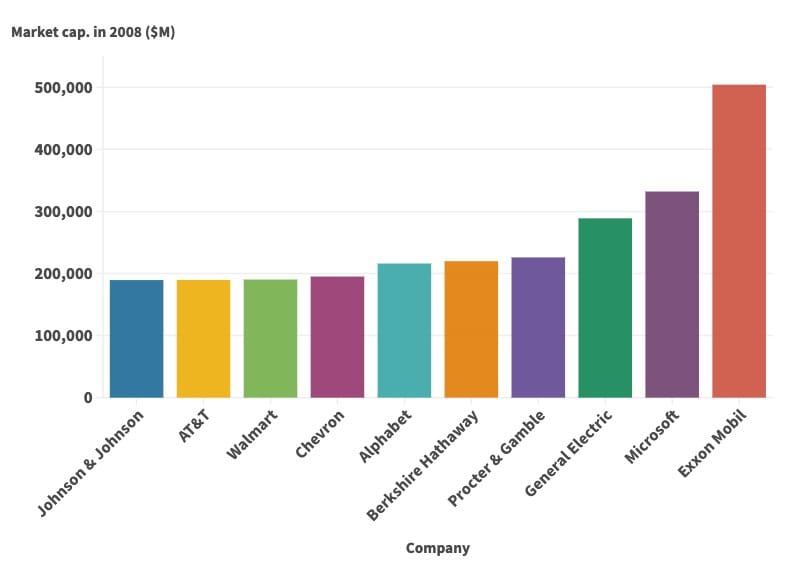
- 10. Johnson & Johnson (JNJ): $189.4 billion market cap. (Industry: Drug manufacturing)
- 9. AT&T (T): $189.6 billion market cap. (Industry: Telecom services)
- 8. Walmart (WMT): $190.4 billion market cap. (Industry: Discount stores)
- 7. Chevron (CVX): $195.1 billion market cap. (Industry: Oil and gas)
- 6. Alphabet (GOOG): $216.1 billion market cap. (Industry: Internet content and information)
- 5. Berkshire Hathaway (BRK-A/B): $219.9 billion market cap. (Industry: Insurance – diversified)
- 4. Procter & Gamble (PG): $226 billion market cap. (Industry: Household and personal products)
- 3. General Electric (GE): $288.9 billion market cap. (Industry: Aerospace and defense)
- 2. Microsoft (MSFT): $332.1 billion market cap. (Industry: Software infrastructure)
- 1. Exxon Mobil (XOM): $504.2 billion market cap. (Industry: Oil and gas)
Year: 2009
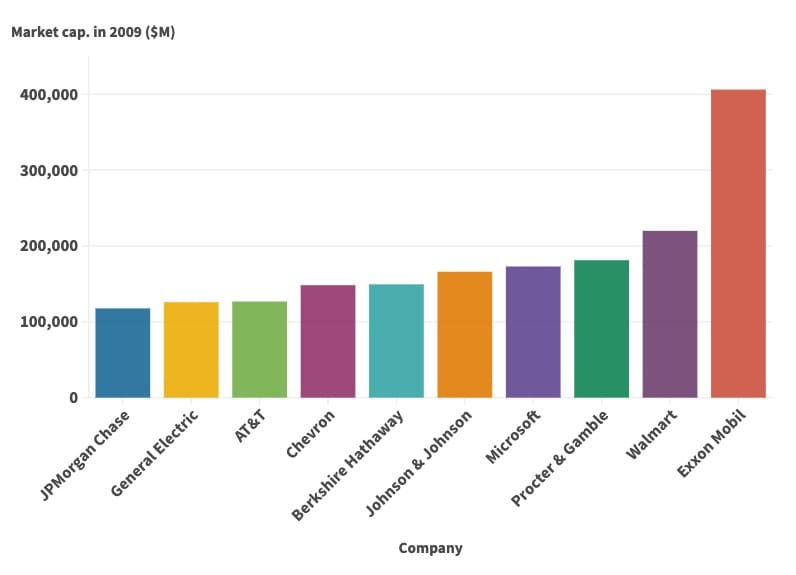
- 10. JPMorgan Chase (JPM): $117.7 billion market cap. (Industry: Banking)
- 9. General Electric (GE): $125.9 billion market cap. (Industry: Aerospace and defense)
- 8. AT&T (T): $126.8 billion market cap. (Industry: Telecom services)
- 7. Chevron (CVX): $148.3 billion market cap. (Industry: Oil and gas)
- 6. Berkshire Hathaway (BRK-A/B): $149.4 billion market cap. (Industry: Insurance – diversified)
- 5. Johnson & Johnson (JNJ): $166 billion market cap. (Industry: Drug manufacturing)
- 4. Microsoft (MSFT): $172.9 billion market cap. (Industry: Software infrastructure)
- 3. Procter & Gamble (PG): $181.2 billion market cap. (Industry: Household and personal products)
- 2. Walmart (WMT): $219.9 billion market cap. (Industry: Discount stores)
- 1. Exxon Mobil (XOM): $406.1 billion market cap. (Industry: Oil and gas)
Year: 2010
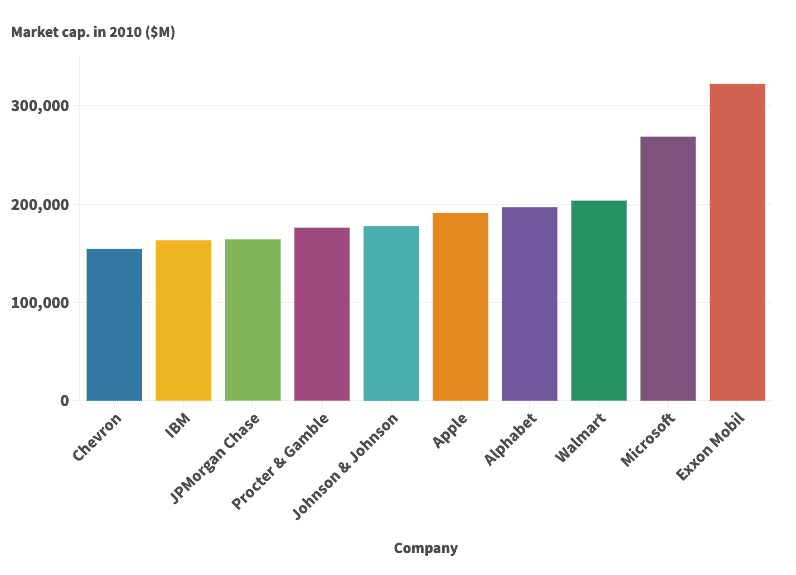
- 10. Chevron (CVX): $154.6 billion market cap. (Industry: Oil and gas)
- 9. International Business Machines (IBM): $163.2 billion market cap. (Industry: Information technology services)
- 8. JPMorgan Chase (JPM): $164.3 billion market cap. (Industry: Banking)
- 7. Procter & Gamble (PG): $176.1 billion market cap. (Industry: Household and personal products)
- 6. Johnson & Johnson (JNJ): $177.7 billion market cap. (Industry: Drug manufacturing)
- 5. Apple (AAPL): $191 billion market cap. (Industry: Consumer electronics)
- 4. Alphabet (GOOG): $196.8 billion market cap. (Industry: Internet content and information)
- 3. Walmart (WMT): $203.7 billion market cap. (Industry: Discount stores)
- 2. Microsoft (MSFT): $268.6 billion market cap. (Industry: Software infrastructure)
- 1. Exxon Mobil (XOM): $322.3 billion market cap. (Industry: Oil and gas)
Year: 2011
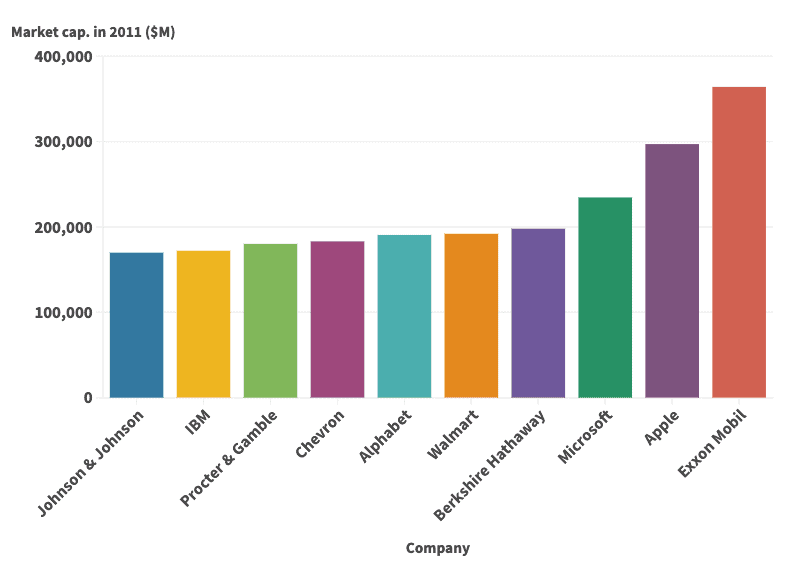
- 10. Johnson & Johnson (JNJ): $169.9 billion market cap. (Industry: Drug manufacturing)
- 9. International Business Machines (IBM): $172.1 billion market cap. (Industry: Information technology services)
- 8. Procter & Gamble (PG): $180.2 billion market cap. (Industry: Household and personal products)
- 7. Chevron (CVX): $183.2 billion market cap. (Industry: Oil and gas)
- 6. Alphabet (GOOG): $190.7 billion market cap. (Industry: Internet content and information)
- 5. Walmart (WMT): $192.1 billion market cap. (Industry: Discount stores)
- 4. Berkshire Hathaway (BRK-A/B): $198.1 billion market cap. (Industry: Insurance – diversified)
- 3. Microsoft (MSFT): $234.5 billion market cap. (Industry: Software infrastructure)
- 2. Apple (AAPL): $297.1 billion market cap. (Industry: Consumer electronics)
- 1. Exxon Mobil (XOM): $364.1 billion market cap. (Industry: Oil and gas)
Year: 2012
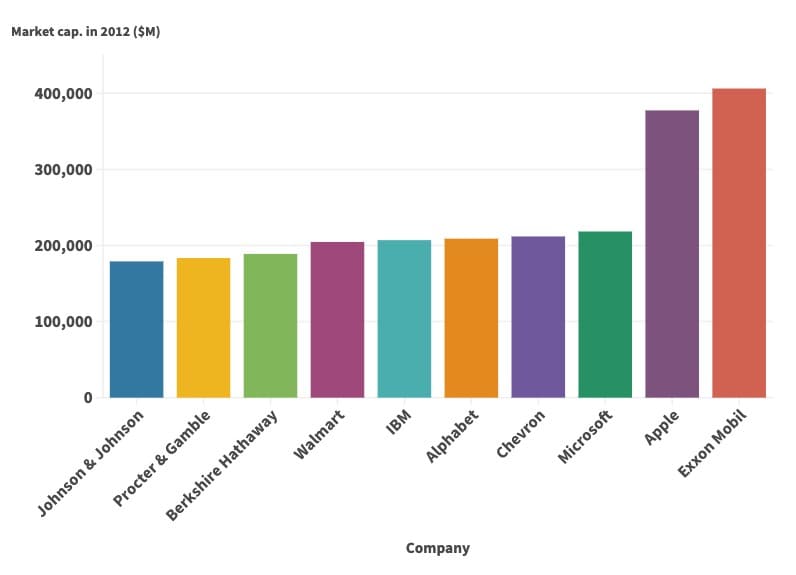
- 10. Johnson & Johnson (JNJ): $179.1 billion market cap. (Industry: Drug manufacturing)
- 9. Procter & Gamble (PG): $183.5 billion market cap. (Industry: Household and personal products)
- 8. Berkshire Hathaway (BRK-A/B): $188.9 billion market cap. (Industry: Insurance – diversified)
- 7. Walmart (WMT): $204.7 billion market cap. (Industry: Discount stores)
- 6. International Business Machines (IBM): $207 billion market cap. (Industry: Information technology services)
- 5. Alphabet (GOOG): $209 billion market cap. (Industry: Internet content and information)
- 4. Chevron (CVX): $211.9 billion market cap. (Industry: Oil and gas)
- 3. Microsoft (MSFT): $218.4 billion market cap. (Industry: Software infrastructure)
- 2. Apple (AAPL): $377.5 billion market cap. (Industry: Consumer electronics)
- 1. Exxon Mobil (XOM): $406.3 billion market cap. (Industry: Oil and gas)
Year: 2013
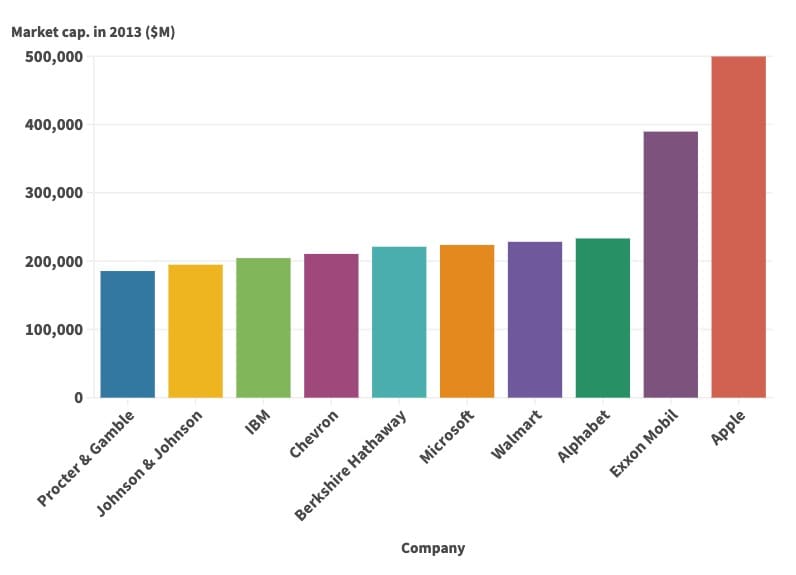
- 10. Procter & Gamble (PG): $185.5 billion market cap. (Industry: Household and personal products)
- 9. Johnson & Johnson (JNJ): $194.8 billion market cap. (Industry: Drug manufacturing)
- 8. International Business Machines (IBM): $204.4 billion market cap. (Industry: Information technology services)
- 7. Chevron (CVX): $210.5 billion market cap. (Industry: Oil and gas)
- 6. Berkshire Hathaway (BRK-A/B): $221.1 billion market cap. (Industry: Insurance – diversified)
- 5. Microsoft (MSFT): $223.7 billion market cap. (Industry: Software infrastructure)
- 4. Walmart (WMT): $228.3 billion market cap. (Industry: Discount stores)
- 3. Alphabet (GOOG): $233.2 billion market cap. (Industry: Internet content and information)
- 2. Exxon Mobil (XOM): $389.7 billion market cap. (Industry: Oil and gas)
- 1. Apple (AAPL): $499.7 billion market cap. (Industry: Consumer electronics)
Year: 2014
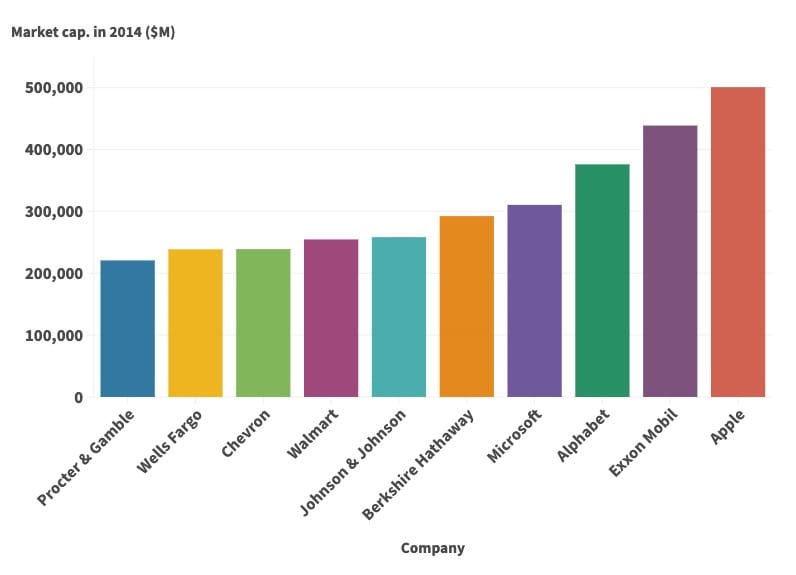
- 10. Procter & Gamble (PG): $220.7 billion market cap. (Industry: Household and personal products)
- 9. Wells Fargo (WFC): $238.7 billion market cap. (Industry: Banking)
- 8. Chevron (CVX): $239 billion market cap. (Industry: Oil and gas)
- 7. Walmart (WMT): $254.6 billion market cap. (Industry: Discount stores)
- 6. Johnson & Johnson (JNJ): $258.3 billion market cap. (Industry: Drug manufacturing)
- 5. Berkshire Hathaway (BRK-A/B): $292.4 billion market cap. (Industry: Insurance – diversified)
- 4. Microsoft (MSFT): $310.5 billion market cap. (Industry: Software infrastructure)
- 3. Alphabet (GOOG): $376 billion market cap. (Industry: Internet content and information)
- 2. Exxon Mobil (XOM): $438.7 billion market cap. (Industry: Oil and gas)
- 1. Apple (AAPL): $500.7 billion market cap. (Industry: Consumer electronics)
Year: 2015
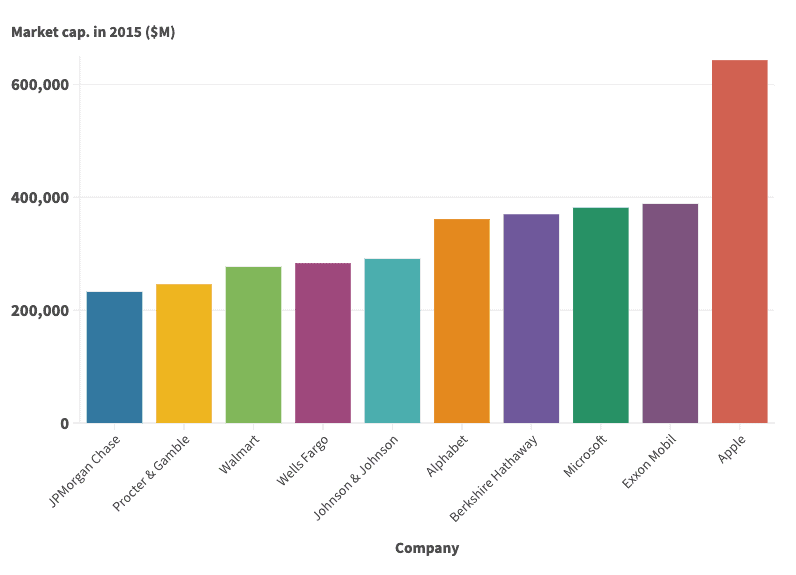
- 10. JPMorgan Chase (JPM): $232.5 billion market cap. (Industry: Banking)
- 9. Procter & Gamble (PG): $246 billion market cap. (Industry: Household and personal products)
- 8. Walmart (WMT): $276.8 billion market cap. (Industry: Discount stores)
- 7. Wells Fargo (WFC): $283.4 billion market cap. (Industry: Banking)
- 6. Johnson & Johnson (JNJ): $291 billion market cap. (Industry: Drug manufacturing)
- 5. Alphabet (GOOG): $361.4 billion market cap. (Industry: Internet content and information)
- 4. Berkshire Hathaway (BRK-A/B): $370 billion market cap. (Industry: Insurance – diversified)
- 3. Microsoft (MSFT): $381.7 billion market cap. (Industry: Software infrastructure)
- 2. Exxon Mobil (XOM): $388.4 billion market cap. (Industry: Oil and gas)
- 1. Apple (AAPL): $643.1 billion market cap. (Industry: Consumer electronics)
Year: 2016
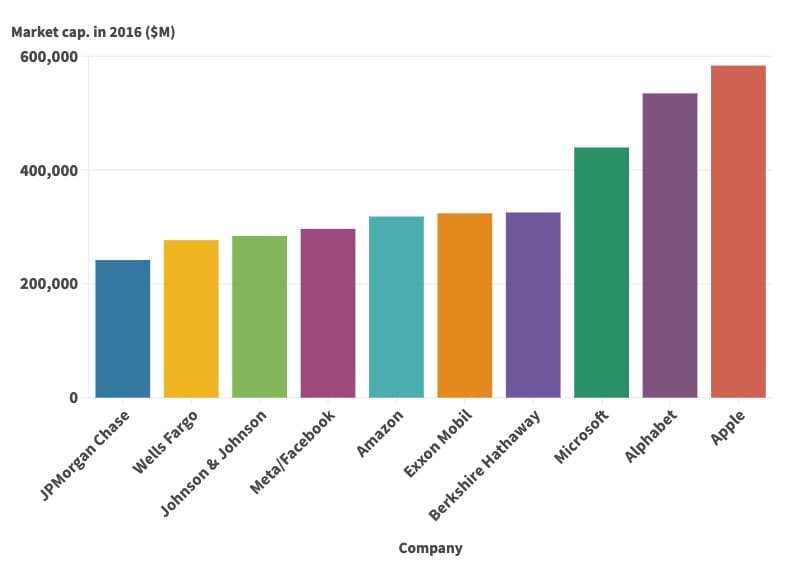
- 10. JPMorgan Chase (JPM): $241.9 billion market cap. (Industry: Banking)
- 9. Wells Fargo (WFC): $276.8 billion market cap. (Industry: Banking)
- 8. Johnson & Johnson (JNJ): $284.2 billion market cap. (Industry: Drug manufacturing)
- 7. Meta/Facebook (META): $296.6 billion market cap. (Industry: Internet content and information)
- 6. Amazon (AMZN): $318.3 billion market cap. (Industry: Internet retail)
- 5. Exxon Mobil (XOM): $324 billion market cap. (Industry: Oil and gas)
- 4. Berkshire Hathaway (BRK-A/B): $325.5 billion market cap. (Industry: Insurance – diversified)
- 3. Microsoft (MSFT): $439.7 billion market cap. (Industry: Software infrastructure)
- 2. Alphabet (GOOG): $534.8 billion market cap. (Industry: Internet content and information)
- 1. Apple (AAPL): $583.6 billion market cap. (Industry: Consumer electronics)
Year: 2017
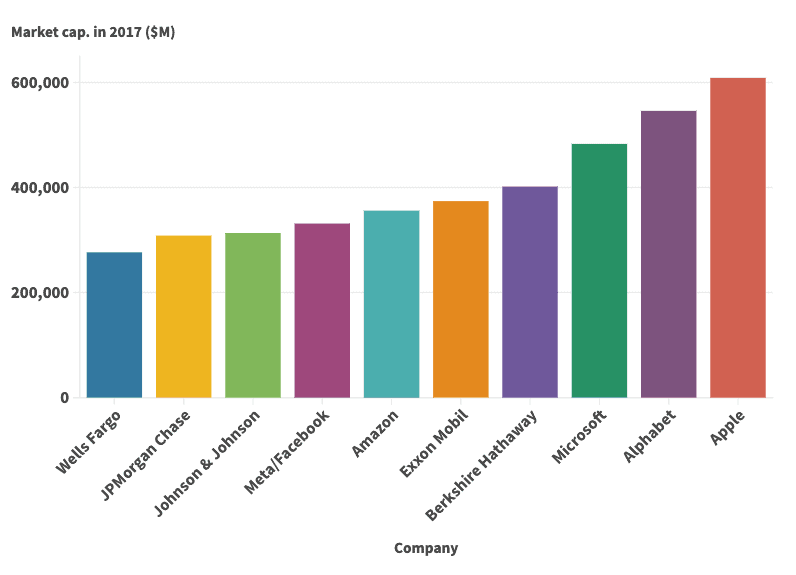
- 10. Wells Fargo (WFC): $276.8 billion market cap. (Industry: Banking)
- 9. JPMorgan Chase (JPM): $308.8 billion market cap. (Industry: Banking)
- 8. Johnson & Johnson (JNJ): $313.4 billion market cap. (Industry: Drug manufacturing)
- 7. Meta/Facebook (META): $331.6 billion market cap. (Industry: Internet content and information)
- 6. Amazon (AMZN): $356.3 billion market cap. (Industry: Internet retail)
- 5. Exxon Mobil (XOM): $374.3 billion market cap. (Industry: Oil and gas)
- 4. Berkshire Hathaway (BRK-A/B): $401.9 billion market cap. (Industry: Insurance – diversified)
- 3. Microsoft (MSFT): $483.2 billion market cap. (Industry: Software infrastructure)
- 2. Alphabet (GOOG): $546.2 billion market cap. (Industry: Internet content and information)
- 1. Apple (AAPL): $609 billion market cap. (Industry: Consumer electronics)
Year: 2018
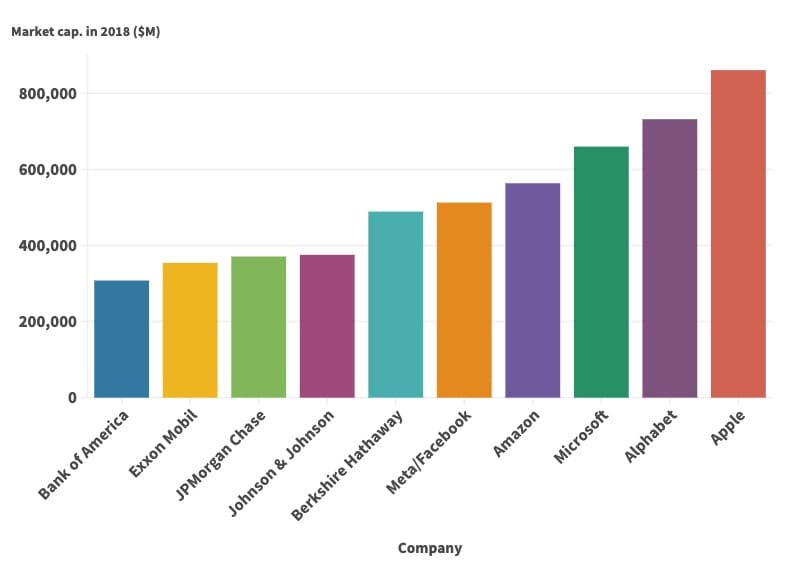
- 10. Bank of America (BAC): $307.9 billion market cap. (Industry: Banking)
- 9. Exxon Mobil (XOM): $354.4 billion market cap. (Industry: Oil and gas)
- 8. JPMorgan Chase (JPM): $371.1 billion market cap. (Industry: Banking)
- 7. Johnson & Johnson (JNJ): $375.4 billion market cap. (Industry: Drug manufacturing)
- 6. Berkshire Hathaway (BRK-A/B): $489.1 billion market cap. (Industry: Insurance – diversified)
- 5. Meta/Facebook (META): $512.8 billion market cap. (Industry: Internet content and information)
- 4. Amazon (AMZN): $563.5 billion market cap. (Industry: Internet retail)
- 3. Microsoft (MSFT): $659.9 billion market cap. (Industry: Software infrastructure)
- 2. Alphabet (GOOG): $731.9 billion market cap. (Industry: Internet content and information)
- 1. Apple (AAPL): $860.9 billion market cap. (Industry: Consumer electronics)
Year: 2019
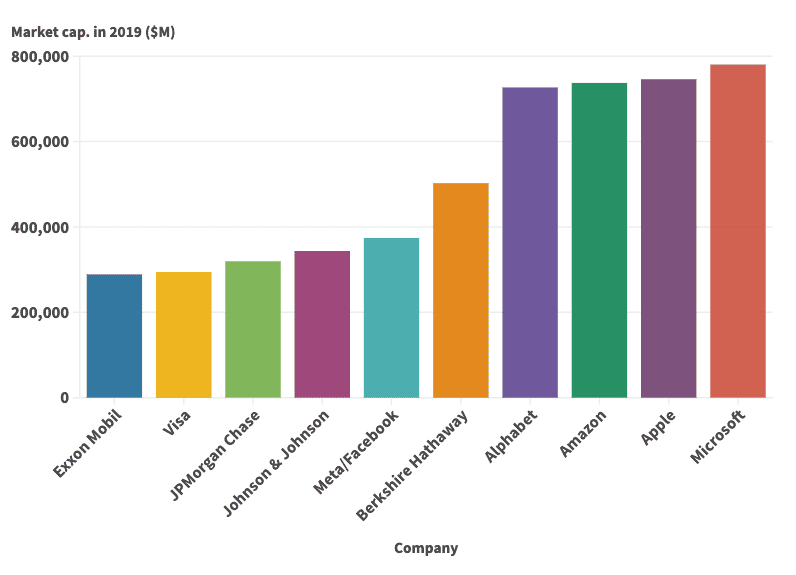
- 10. Exxon Mobil (XOM): $288.9 billion market cap. (Industry: Oil and gas)
- 9. Visa (V): $294 billion market cap. (Industry: Credit services)
- 8. JPMorgan Chase (JPM): $319.8 billion market cap. (Industry: Banking)
- 7. Johnson & Johnson (JNJ): $343.6 billion market cap. (Industry: Drug manufacturing)
- 6. Meta/Facebook (META): $374.1 billion market cap. (Industry: Internet content and information)
- 5. Berkshire Hathaway (BRK-A/B): $502.6 billion market cap. (Industry: Insurance – diversified)
- 4. Alphabet (GOOG): $726.8 billion market cap. (Industry: Internet content and information)
- 3. Amazon (AMZN): $737.5 billion market cap. (Industry: Internet retail)
- 2. Apple (AAPL): $746.1 billion market cap. (Industry: Consumer electronics)
- 1. Microsoft (MSFT): $780.4 billion market cap. (Industry: Software infrastructure)
Year: 2020
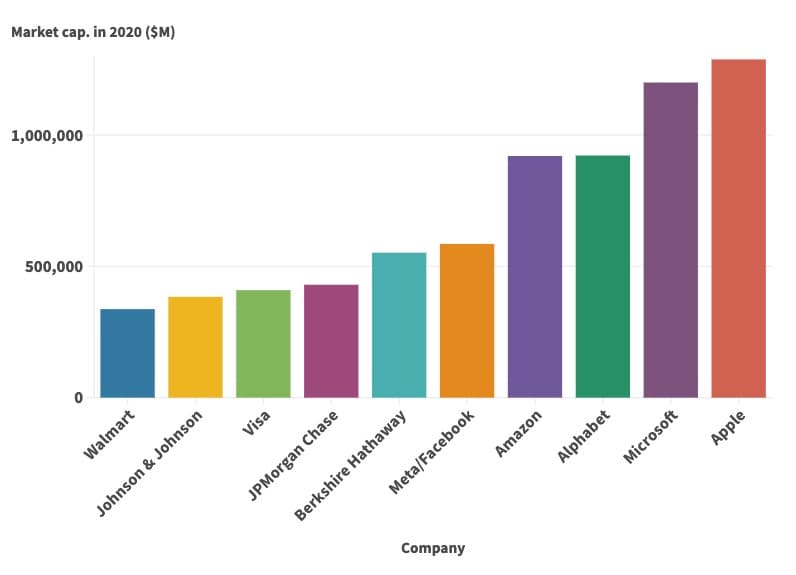
- 10. Walmart (WMT): $337.2 billion market cap. (Industry: Discount stores)
- 9. Johnson & Johnson (JNJ): $384 billion market cap. (Industry: Drug manufacturing)
- 8. Visa (V): $409.4 billion market cap. (Industry: Credit services)
- 7. JPMorgan Chase (JPM): $429.9 billion market cap. (Industry: Banking)
- 6. Berkshire Hathaway (BRK-A/B): $552.1 billion market cap. (Industry: Insurance – diversified)
- 5. Meta/Facebook (META): $585.4 billion market cap. (Industry: Internet content and information)
- 4. Amazon (AMZN): $920.2 billion market cap. (Industry: Internet retail)
- 3. Alphabet (GOOG): $922 billion market cap. (Industry: Internet content and information)
- 2. Microsoft (MSFT): $1.2 trillion market cap. (Industry: Software infrastructure)
- 1. Apple (AAPL): $1.3 trillion market cap. (Industry: Consumer electronics)
Year: 2021
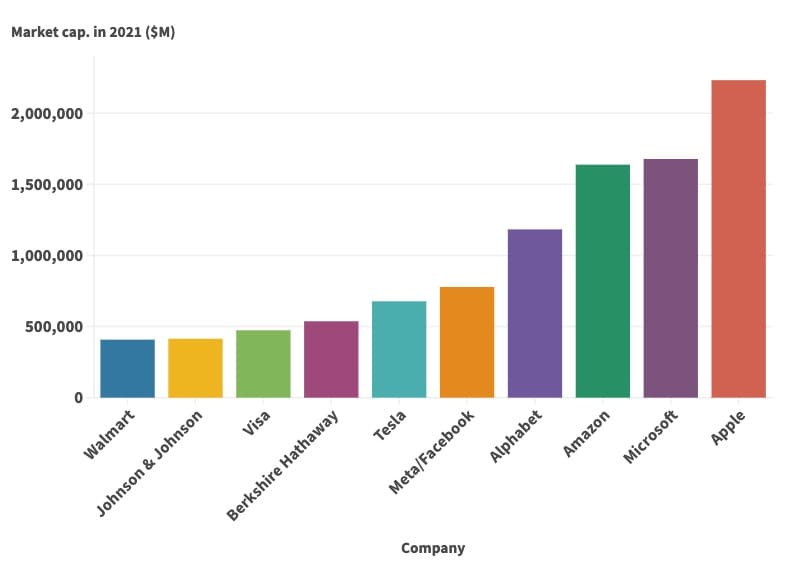
- 10. Walmart (WMT): $407.8 billion market cap. (Industry: Discount stores)
- 9. Johnson & Johnson (JNJ): $414.3 billion market cap. (Industry: Drug manufacturing)
- 8. Visa (V): $473.8 billion market cap. (Industry: Credit services)
- 7. Berkshire Hathaway (BRK-A/B): $537 billion market cap. (Industry: Insurance – diversified)
- 6. Tesla (TSLA): $677.4 billion market cap. (Industry: Auto manufacturing)
- 5. Meta/Facebook (META): $778.2 billion market cap. (Industry: Internet content and information)
- 4. Alphabet (GOOG): $1.2 trillion market cap. (Industry: Internet content and information)
- 3. Amazon (AMZN): $1.6 trillion market cap. (Industry: Internet retail)
- 2. Microsoft (MSFT): $1.7 trillion market cap. (Industry: Software infrastructure)
- 1. Apple (AAPL): $2.2 trillion market cap. (Industry: Consumer electronics)
Year: 2022
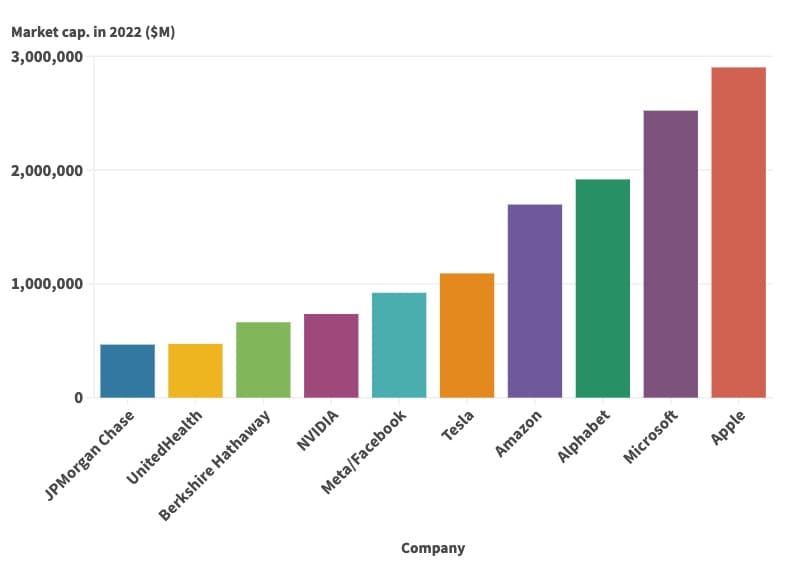
- 10. JPMorgan Chase (JPM): $466.2 billion market cap. (Industry: Banking)
- 9. UnitedHealth (UNH): $472.5 billion market cap. (Industry: Healthcare plans)
- 8. Berkshire Hathaway (BRK-A/B): $662.6 billion market cap. (Industry: Insurance – diversified)
- 7. NVIDIA (NVDA): $735.3 billion market cap. (Industry: Semiconductors)
- 6. Meta/Facebook (META): $921.9 billion market cap. (Industry: Internet content and information)
- 5. Tesla (TSLA): $1.1 trillion market cap. (Industry: Auto manufacturing)
- 4. Amazon (AMZN): $1.7 trillion market cap. (Industry: Internet retail)
- 3. Alphabet (GOOG): $1.9 trillion market cap. (Industry: Internet content and information)
- 2. Microsoft (MSFT): $2.5 trillion market cap. (Industry: Software infrastructure)
- 1. Apple (AAPL): $2.9 trillion market cap. (Industry: Consumer electronics)
Year: 2023
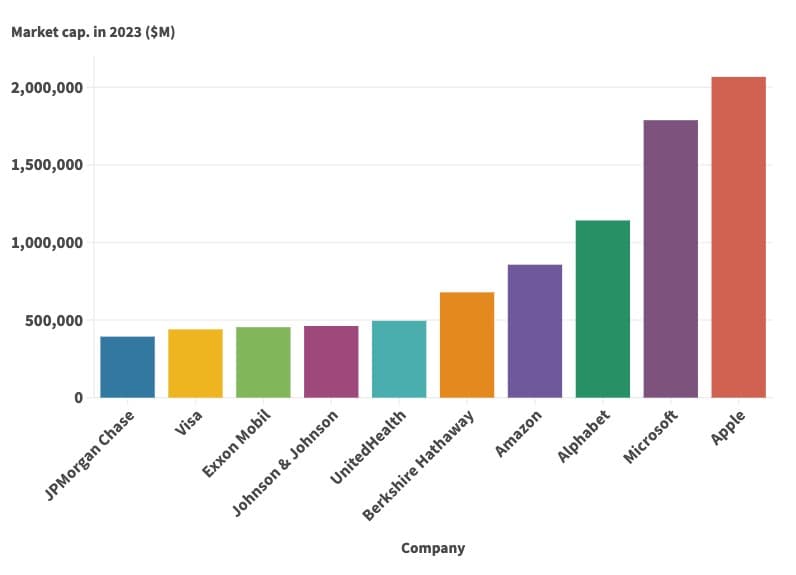
- 10. JPMorgan Chase (JPM): $393.3 billion market cap. (Industry: Banking)
- 9. Visa (V): $440 billion market cap. (Industry: Credit services)
- 8. Exxon Mobil (XOM): $454.3 billion market cap. (Industry: Oil and gas)
- 7. Johnson & Johnson (JNJ): $461.9 billion market cap. (Industry: Drug manufacturing)
- 6. UnitedHealth (UNH): $495.4 billion market cap. (Industry: Healthcare plans)
- 5. Berkshire Hathaway (BRK-A/B): $678.7 billion market cap. (Industry: Insurance – diversified)
- 4. Amazon (AMZN): $856.9 billion market cap. (Industry: Internet retail)
- 3. Alphabet (GOOG): $1.1 trillion market cap. (Industry: Internet content and information)
- 2. Microsoft (MSFT): $1.8 trillion market cap. (Industry: Software infrastructure)
- 1. Apple (AAPL): $2.1 trillion market cap. (Industry: Consumer electronics)
Year: 2024
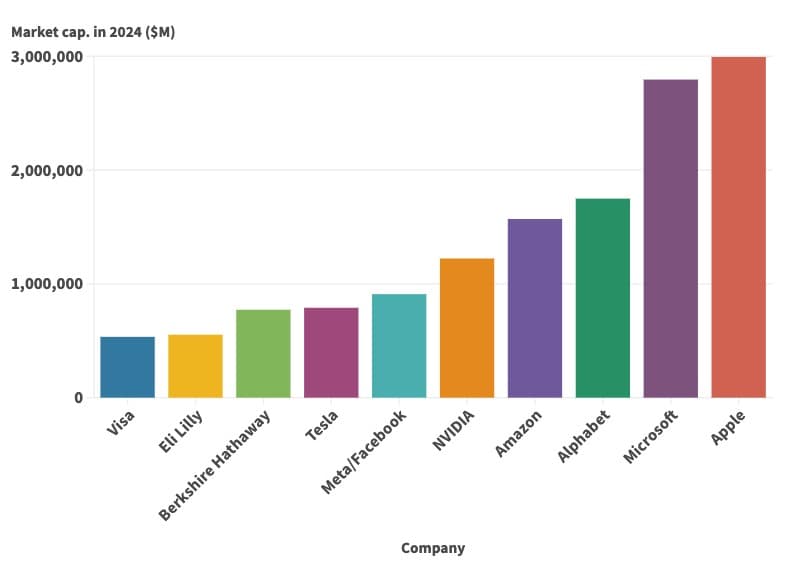
- 10. Visa (V): $534.6 billion market cap. (Industry: Credit services)
- 9. Eli Lilly (LLY): $553.4 billion market cap. (Industry: Drug manufacturing)
- 8. Berkshire Hathaway (BRK-A/B): $772.5 billion market cap. (Industry: Insurance – diversified)
- 7. Tesla (TSLA): $789.9 billion market cap. (Industry: Auto manufacturing)
- 6. Meta/Facebook (META): $909.8 billion market cap. (Industry: Internet content and information)
- 5. NVIDIA (NVDA): $1.2 trillion market cap. (Industry: Semiconductors)
- 4. Amazon (AMZN): $1.6 trillion market cap. (Industry: Internet retail)
- 3. Alphabet (GOOG): $1.7 trillion market cap. (Industry: Internet content and information)
- 2. Microsoft (MSFT): $2.8 trillion market cap. (Industry: Software infrastructure)
- 1. Apple (AAPL): $3 trillion market cap. (Industry: Consumer electronics)
Thank you for reading! Have some feedback for us?
Contact the 24/7 Wall St. editorial team.



